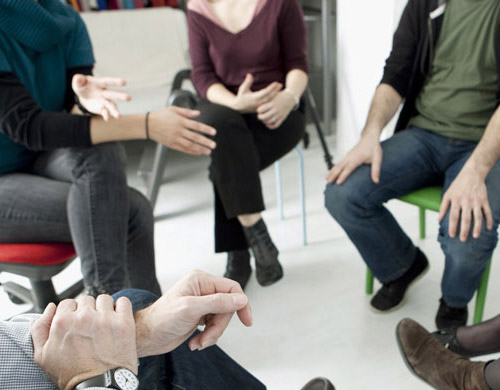Drug and alcohol use disorders are hard to address when they hurt you or someone close to you. You can treat addiction even though it is a disease, and long term recovery is possible through professional rehab intervention methods.
Learn more about how integrated rehabilitation services can help you or a loved one in beginning and maintaining a sober future.
What is Addiction Rehab (Rehabilitation)?
Addiction ‘rehab’ refers to the process of medical treatment and psychotherapeutic interventions to tackle your dependence on substances like illegal drugs, prescription drugs and alcohol.
Addiction Rehab that is customized to your lifestyle needs is successful when it includes medically supported detox, inpatient programs, outpatient programs and aftercare.

Facts & Statistics about Addiction in Nevada County
Prevalence of Substance Use Disorder, by Drug Type
(IN THOUSANDS)
- 2,7578.5%Any Substance
- 2,0886.4%Alcohol
- 1,0683.3%Ilicit Drugs
- 2060.6%Pain Medication
Drug- and Alcohol-Induced Deaths by Age Group, California, 2016
- Alcohol-Induced
- Drug-Induced
- 18 to 250.5
- 9.6
- 26 to 354.3
- 13.9
- 36 to 6424.2
- 22.9
- 65+23.7
- 9.4
Drug Use, by Selected Type and Age Group California, 2015 to 2016
- 12 to 17
- 18 to 25
- 26+
- Marijuana*13.2%
- 34.0%
- 13.5%
- Misuse of Pain Medications3.5%
- 8.0%
- 4.3%
- Cocaine0.8%
- 7.2%
- 1.8%
- Heroin0%
- 0.4%
- 0.2%
What are the treatment options available in Nevada County?
A consolidated treatment approach is the most successful way to identify & tackle the root causes of drug or alcohol dependencies. Through learning healthy coping strategies you can address the causes of substance abuse while treating the main symptoms of addiction.

Private Residential Programs
When you stay within the property where you are receiving addiction treatment, you are in a residential program. One of the key benefits is access to 24/7 treatment and guidance. By displacing yourself from your home and living at the rehab facility you will safeguard yourself against the stressors that keep you trapped in the cycle of drug or alcohol dependence.
When you stay in a safe and supportive environment you can protect yourself against relapse and increase the odds of finishing your addiction treatment program.
Residential addiction treatment programs are considered most effective if your drug or alcohol dependency is chronic and severe, or if you experience co-occurring disorders or a dual diagnosis. A residential program will assist you with getting sober, but maintaining sobriety requires persistent effort as the first few months of recovery can be challenging. Once the inpatient program is complete you will want to be more independent and your focus will be on what you would like from your new life.
Do You Need Help?
Our addiction advisers are here to help you.

Sober Living Programs
Sober living rehab programs are designed to enable you to have more control over your life, with guidance and a support structure. These programs incorporate:
- A house manager who will visit you regularly
- Advising you on the right way to behave in recovery
- Fostering necessary friendships with others in recovery who understand your experiences
Outpatient Programs
Outpatient rehab programs provide more flexibility as you can continue with work commitments while living at home, but you visit the rehab center for your treatments.
Outpatient programs teach you:
- Education around substance abuse
- Counseling and therapy by means of group support or one-on-one sessions – The expected duration of an outpatient program is 3/4 months and may last longer than a year, this will depend on your individual needs.
Detox Only Programs
Most individuals need a medical detox to initiate drug rehab, as it addresses physical dependencies on substances by removing it from your body. Symptoms of withdrawal is the body’s normal response to detoxification, as it begins getting used to functioning without substances.
This marks the beginning of your rehabilitation process, the next stage is to confront and manage the root problems that lead to your addiction, so that the pattern does not repeat. It is common to develop withdrawal and cravings for some time after the substance has been eliminated from your system. You can limit the odds of relapse by developing coping skills for long-term abstinence.
Paying for Private Treatment
If you want to enroll on private rehab, you will need to cover the costs or begin a claim via your healthcare policy. A large percentage of health insurance providers will cover some of the costs of rehab, which includes drug or alcohol detox, the rehab program, medicines you may need and aftercare and support. The amount of cover you can claim will differ depending on your policy and provider.
You should determine the amount you can claim against your policy before you enroll in a rehab program. To find out what you could qualify for, visit our Verify Your Insurance page here.
If you do not claim your policy, you must pay upfront for your rehab treatment. Many treatment providers will consider payment plans to clients who may struggle to pay for treatment upfront.
State Funded Programs
If you have fallen victim to substance dependence and do not have the resources to fund private treatment, you may opt for a state-funded rehab program.
Via state funding and medicaid, these programs may kickstart your recovery with:
- Programs for a safe detox (medically-supervised if required.
- Addiction counseling, therapy and aftercare support services
These sorts of programs are intended to support people with little disposable income or those with no health insurance. To enroll you will need:
- Proof of who you are and where you live
- Proof of finances
- Details about your addiction from your medical history and details about your addiction
- Proof that you live in the US legally
You can discover more about the application process here: https://www.grants.gov/
This pdf document provides your state agency’s contact details.

The following state-funded addiction rehab programs are available in Nevada County:
Granite Wellness Centers Lovett Recovery Center
180 Sierra College Drive, Grass Valley, CA 95945
530-273-9541
https://www.granitewellness.org/Granite Wellness Centers
180 Sierra College Drive, Grass Valley, CA 95945
530-273-9541 x227
https://www.granitewellness.org/Granite Wellness Centers Grass Valley Campus/Inpatient
159 Brentwood Drive, Grass Valley, CA 95945
530-271-1140 x247
https://www.granitewellness.org/
Maintaining Addiction Recovery in Nevada County
Maintaining recovery can feel difficult once you return to life outside of rehab. The rehab environment was controlled and safe, and you were given professional support. When you depart rehab there will be some new challenges that you will have to learn to cope with. Long term sobriety is more difficult to maintain when you have had a severe dependency and do not have social support when you leave rehab. Without the relevant support and aftercare to guide you in your new life, relapse is a real possibility.
The following AA/NA meetings are available in Nevada County:
Nevada County Library
Open, Speaker and Discussion/Participation:
980 Helling Way, Nevada City, CA 95959
Saturday: 8:45 PM
https://findrecovery.com/AA - Library Hwy 49
12 Steps And 12 Traditions and Open: 317 Main Street, Nevada City, CA, 95959
Thursday: 7:00 pm – 8:00 pm
https://alcoholicsanonymous.com/AA Meeting – Nevada City – Nevada City
Open Meeting of Alcoholics Anonymous:
Bost Ave., Nevada City, CA 95959
Wednesday: 6:30 PM
https://findrecovery.com/

Aftercare & Alumni Programs
An aftercare program is a resource to support your recovery when you go back to your daily life. By participating in aftercare support, you can lessen the risk of relapse, which impacts 60% of individuals who have recently completed treatment. It is an essential service provided by most treatment centres.
When you get closer to completing your treatment program, you may consider which services will benefit your long-term recovery. We can establish an aftercare program that protects you. Alumni programs benefit from completing treatment and allow you community access to former clients and staff.
You will have access to special events and receive guidance and encouragement from other people who are also in recovery long-term. We encourage you to consider helping other members who are part of your network if you choose to.
Support Groups (Fellowship Meetings)
Staying active in support groups is useful because connecting with others enables long-lasting addiction recovery. A couple of the best and most useful support groups are Alcoholics Anonymous and Narcotics Anonymous, which make use of the 12-steps to support those in recovery via nearby meetings. By attending nearby support group sessions, you will hear and understand other members’ experiences. Friendship, empowerment and accountability for our actions are key to long-term recovery, and support groups provide many with the necessary tools to stay sober.
Support for Families & Children Affected by Addiction
Each person in a family is negatively affected, to a varying degree, by addiction. Although the person struggling with dependence certainly needs all the help they can get, the other family members also need counseling.
Support groups for families has two important benefits: you can support yourself and the individual in the early stages of recovery. Some useful support groups for families and children affected by addiction include:
- Parents of Addicted Loved Ones
- SMART Recovery Family & Friends
- NAMI Family Support Groups
- Al-Anon
- Families Anonymous
- Alateen
- Nar-Anon










